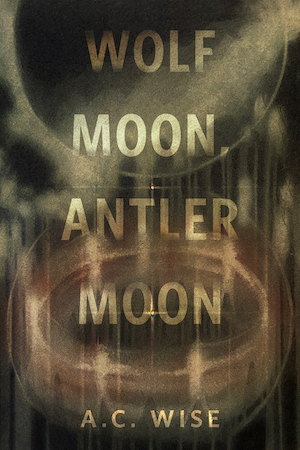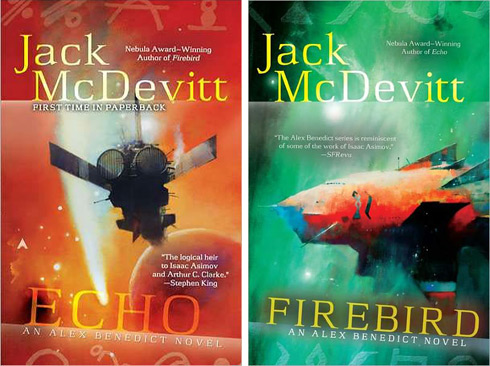This month sees the publication of the sixth novel in Jack McDevitt’s Alex Benedict series, the aptly-titled Firebird. Like its predecessors, from A Talent for War (1989) up to last year’s Echo, it has to do with interstellar archaeology, complicated research, and questions of ethics; and like its predecessors, it features Alex Benedict, antiquities dealer, and his pilot/business associate Chase Kolpath.
Ten thousand years in the future, the human race looks very much as it does today. FTL travel, flying cars, and artificial intelligences provide the major differences: that, and the enormous span of time for the rise and fall of planetary civilisations. You don’t read McDevitt for posthumanism and technogeek-style Visionary Science, or innovative sociological developments. No, you read him for archaeology! in! spaaaaace! For the puzzle, for the impression of real, deep future history, and for the profound sense of the vastness and beauty of time and the universe. McDevitt has his faults as a writer, but lack of ability to evoke the magnificence of a nebula or the pathos in the sweep of human history is not among them. I’ve elsewhere seen him called a master of describing otherworldly grandeur, and to be honest, I can’t bring myself to argue.
Here’s a passage from Echo by way of demonstration:
“[S]he arced her ship around the curve of a terrestrial world while the tourists watched a golden sunrise. She took them over placid oceans, and clouds drifting in moonlight. She descended into canyons on rugged lunar surfaces and glided just above the atmosphere of a gas giant while showing her passengers an enormous, vaporous creature that moved silently through the haze.”
Firebird opens with the mystery of disappearing fringe physicist (and alleged genius) Dr. Christopher Robin,* who quite literally seemed to have disappeared off the face of the planet some years before. After the death of Robin’s wife, Alex Benedict is asked to handle an auction of personal belongings, and—in part due to his own curiosity, in part to a desire to push up the price—Benedict starts to investigate. What results are talkshow rounds, a visit to a planet inhabited solely by murderous AIs, and interstellar Flying Dutchmen.
And yes, an explanation for what did really happen to Dr. Robin.
*I am not the only person in the audience whose mind immediately went to A.A. Milne, am I?
Firebird juxtaposes the familiar and the bizarre in a manner characteristic of McDevitt’s previous Alex Benedict novels. It’s a faster, more elegant read than Echo, more along the lines of Seeker and Polaris, and maintains a balance between its tension and a certain tendency towards expansiveness. (Where Echo is slow and discursive but nonetheless interesting, Firebird achieves a much swifter pace.)
With the exception of A Talent for War, all of the Alex Benedict novels are actually told from the point of view of pilot Chase Kolpath. This makes for an occasionally peculiar reading experience, when you can see that things are being held back from the narrative, with no pretence about the fact. Kolpath sometimes plays Watson to Benedict’s Sherlock, which is fine if you like that sort of thing, but intermittently provoking if you don’t.
Despite the archaeology in space and generally engaging tone, I’m reluctantly compelled to admit that the Alex Benedict novels, Firebird among them, have their flaws. McDevitt is not the world’s best character writer: he doesn’t write emotion particularly well, and motivations sometimes turn out to be murkier, in the end, that your tidy-minded correspondent would really prefer. And I have yet to make up my mind as to whether either Alex or Chase possesses anything resembling a real human’s sense of humour, nor whether the epilogue of Firebird is brilliantly poignant or incredibly pointless.
These minor quibbles aside, however, the Alex Benedict stories—and Firebird not least—are immensely entertaining. Which means I can recommend them without hesitation.
I mean, archaeology in space. What’s not to like?
Where archaeology is concerned, Liz Bourke freely admits her biases. Doesn’t everybody like potsherds, bone fragments, and peculiar objects?











I have been meaning to start reading this series for a while. This article is just the kick in the butt I need to get me started.